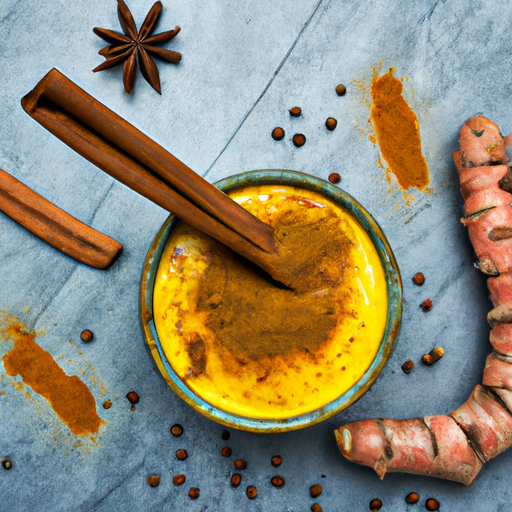Picture yourself in a lively market, enveloped by the vivid hues and aromas of unique herbs and spices. While meandering through the stands, your attention is captured by a vivid yellow root called turmeric. With a history of use in ancient healing practices, this spice has now become renowned for its possible advantages in health, such as alleviating inflammation and enhancing cognitive function.
But can you use turmeric in tea? The answer is yes, and in this article, we will explore the science behind turmeric’s health benefits, how to make delicious turmeric tea, and other ways to incorporate this powerful spice into your diet.
Turmeric tea is a delicious and easy way to reap the benefits of this potent spice. Whether you are looking to improve your overall health, reduce inflammation, or simply enjoy a warm cup of tea, turmeric can be a great addition to your daily routine. But with so many different types of tea and recipes to choose from, it can be hard to know where to start.
In this article, we will guide you through the process of making turmeric tea, offer tips for creating the perfect cup, and provide you with some delicious recipes to try. So, grab your favorite mug and let’s get started!
Key Takeaways
- Turmeric can be used in tea to provide potential health benefits, including anti-inflammatory and antioxidant properties, support for digestive health, and immune system boosting.
- Turmeric tea can be prepared with either turmeric powder or grated fresh turmeric root, with optional ingredients like cinnamon, black pepper, and honey added for flavor and added health benefits.
- Turmeric tea should be consumed in moderation, with potential side effects monitored and healthcare provider consulted if taking certain medications.
- Drinking turmeric tea every day can be safe and offers a variety of health benefits, but should not be consumed as a replacement for water or other healthy beverages.
The Science Behind Turmeric’s Health Benefits
You may be wondering about the science behind turmeric’s health benefits, particularly in relation to tea.
Well, turmeric is known for its powerful anti-inflammatory and antioxidant properties, which can help combat inflammation and oxidative stress in the body.
Additionally, turmeric has been shown to support digestive health and boost the immune system, making it a beneficial addition to your daily routine.
Anti-inflammatory properties
Feeling achy and inflamed? Adding turmeric to your tea can help soothe inflammation and promote overall wellness. Turmeric is a spice that’s been used for centuries in traditional medicine due to its natural anti-inflammatory properties.
While some people choose to take turmeric supplements, adding it to your tea is a simple and effective way to incorporate it into your daily routine. The recommended turmeric dosage varies depending on the form and concentration of the turmeric you’re using, but it’s generally safe to consume up to 2 teaspoons of ground turmeric per day.
By incorporating turmeric into your tea, you can reap the benefits of its anti-inflammatory properties while enjoying a warm and comforting beverage. And, as we’ll explore in the next section, turmeric also has antioxidant properties that can further support your overall health and well-being.
Antioxidant properties
Imagine sipping on a warm cup of tea that not only tastes great but also offers numerous health benefits. Turmeric, a common kitchen spice, can be added to your tea to provide not only anti-inflammatory properties but also antioxidant benefits.
Antioxidants are essential to our health because they protect our cells from damage caused by free radicals. Free radicals are unstable molecules that can cause cellular damage, leading to chronic diseases such as cancer, diabetes, and heart disease.
While turmeric supplements are available, incorporating antioxidant-rich foods into your diet is always a better option. Turmeric has been shown to be an excellent source of antioxidants, which can help to protect your body from damage caused by free radicals. Drinking turmeric tea regularly can help to boost your body’s antioxidant levels, making it a great addition to your diet.
As we move forward, we’ll discuss the digestive health benefits of incorporating turmeric into your diet.
Digestive health benefits
Did you know that incorporating turmeric into your diet can help improve your digestive health? Turmeric supplements have been found to have many benefits for digestion, including reducing symptoms of indigestion and improving gut health. In fact, one study found that 87% of participants experienced relief from bloating and gas after taking a turmeric supplement.
But what about turmeric tea? Is it just as effective as taking capsules? While turmeric tea can be a tasty way to incorporate this spice into your diet, it may not be as effective as taking supplements. This is because the active ingredient in turmeric, curcumin, is not very soluble in water. However, if you enjoy turmeric tea, it certainly won’t hurt to include it in your diet as it may still offer some benefits for digestion.
With its ability to improve digestive health, it’s clear that turmeric can be a valuable addition to your diet. But did you know that it can also support your immune system?
Immune system support
Boost your immune system by incorporating turmeric into your diet. It has been found to have immune-boosting properties. Some of the immune system benefits of turmeric include fighting off viruses and infections. Turmeric has been shown to have antiviral and antibacterial properties, which can help your body fight off infections and viruses.
Additionally, turmeric has been found to reduce inflammation. Chronic inflammation can weaken the immune system, and turmeric has anti-inflammatory effects that may help prevent this. Finally, turmeric can boost antioxidant activity. Antioxidants help protect the body from damage caused by free radicals, which can weaken the immune system. Turmeric contains compounds that have antioxidant properties, which can help boost your body’s defenses.
To reap these benefits, try incorporating turmeric into your tea. There are many turmeric tea recipes available online that can help you add this spice to your daily routine. Now, let’s take a closer look at how to make turmeric tea.
How to Make Turmeric Tea
If you’re interested in making turmeric tea, there are a few things you should keep in mind to ensure that you get the most out of this healthful beverage.
First, be sure to choose the right type of turmeric – look for high-quality, organic turmeric powder or fresh roots.
Next, preparing the tea is fairly simple – all you need is some hot water and a few basic ingredients.
Finally, if you want to add some extra flavor and health benefits, you can experiment with adding other ingredients like ginger, lemon, honey, or black pepper.
Choosing the right turmeric
When you’re selecting turmeric for your tea, make sure to pick the freshest and most vibrant root, like a golden sunbeam shining through the spice aisle. Here are some things to keep in mind when choosing the right turmeric:
-
Fresh or powdered: Fresh turmeric root has a stronger flavor and more health benefits, but it can be harder to find and store. Powdered turmeric is more convenient, but it may not have the same potency as fresh.
-
Organic or conventional: Choosing organic turmeric ensures that it hasn’t been treated with pesticides or other harmful chemicals. However, conventional turmeric may still be safe to consume.
-
Turmeric supplements: While turmeric supplements can be a convenient way to consume the spice, it’s important to choose a reputable brand and follow dosage recommendations to avoid potential side effects.
Once you’ve selected the perfect turmeric for your tea, it’s time to prepare it.
Preparing the tea
Get ready to savor the warm, comforting aroma of this deliciously spiced beverage as you brew up a steaming cup of golden turmeric tea.
There are various ways to prepare turmeric tea, depending on your personal preferences. You can experiment with different tea variations such as green tea or black tea, or stick to a classic turmeric tea recipe.
Once you have chosen your tea base, you can start preparing your turmeric tea. To prepare the tea, bring water to a boil and add turmeric powder or grated fresh turmeric root to the pot. Let it simmer for about 10 minutes to allow the flavors to infuse.
The steeping time can vary depending on your desired strength and taste. Some people prefer a stronger turmeric taste and let it steep for up to 15 minutes. After steeping, strain the mixture and add your preferred sweetener or milk.
Now that you have brewed a delicious cup of turmeric tea, it’s time to enhance the flavor with optional ingredients.
Note: Remember to consult with your healthcare provider if you have any medical conditions or are taking any medications before consuming turmeric.
Optional ingredients to enhance the flavor
To really elevate the taste of your turmeric beverage, consider adding a dash of cinnamon, a pinch of black pepper, and a spoonful of honey for a sweet finish. These alternative ingredients not only enhance the flavor of your tea, but also provide additional health benefits. Cinnamon, for instance, is known to have anti-inflammatory and antioxidant properties, while black pepper can increase the bioavailability of curcumin, the main active ingredient in turmeric. Honey, on the other hand, not only adds sweetness, but also has antibacterial and anti-inflammatory properties.
Incorporating these optional ingredients can turn a simple turmeric tea into a delicious and nutritious beverage. To help you further understand the benefits of adding these ingredients, refer to the table below:
| Ingredient | Benefits |
|---|---|
| Cinnamon | Anti-inflammatory and antioxidant properties |
| Black Pepper | Increases curcumin bioavailability |
| Honey | Antibacterial and anti-inflammatory properties |
By adding these alternative ingredients to your turmeric tea, you can not only improve its taste, but also enhance its health benefits. However, there are still a few more tips you can use to make your turmeric tea even more delicious.
Tips for Making Delicious Turmeric Tea
If you’re looking to enhance the flavor of your turmeric tea, try adding a pinch of cinnamon or honey for a sweet and spicy twist. These optional ingredients not only give your tea an extra boost of flavor but also provide added health benefits.
Cinnamon has anti-inflammatory properties and can aid in digestion, while honey has antibacterial properties and can help soothe a sore throat. When making turmeric tea, it’s important to use freshly grated turmeric root for the best flavor and health benefits.
Variations in flavor can be achieved by adding different spices such as ginger or cardamom. Steeping time also plays a crucial role in the flavor profile and level of intensity. A longer steeping time will result in a stronger, more robust flavor. However, be careful not to steep for too long as it can result in a bitter taste.
As you explore different flavors and steeping techniques for your turmeric tea, it’s important to consider the best time to drink it. In the next section, we’ll discuss the optimal times to consume turmeric tea for maximum health benefits.
The Best Time to Drink Turmeric Tea
For maximum health benefits, it’s important to know when the best time is to enjoy a cup of this golden elixir. Drinking turmeric tea at the right time can help you reap all of its benefits, including improved digestion, reduced inflammation, and increased antioxidant activity. So, what is the best time to drink turmeric tea? Let’s take a look at the table below:
| Best Time to Drink Turmeric Tea | Benefits of Drinking |
|---|---|
| Morning | Boosts metabolism and energy |
| Afternoon | Helps with digestion and reduces inflammation |
| Evening | Improves sleep and relaxation |
As you can see, the best time to drink turmeric tea depends on what you are looking to achieve. Drinking it in the morning can help boost your metabolism and energy levels, while drinking it in the afternoon can aid in digestion and reduce inflammation. Drinking it in the evening can help you unwind and relax, leading to a better night’s sleep.
Now that you know the best times to drink turmeric tea, it’s important to also be aware of any precautions and potential side effects.
Precautions and Potential Side Effects
Be careful when consuming turmeric tea as it can cause some potential side effects. These may include an upset stomach or a sensation of burning in your throat that feels like you’ve just eaten a handful of fire ants. Additionally, some people may experience potential turmeric allergies. This can result in skin rash, hives, or difficulty breathing. If you experience any of these symptoms, discontinue use and seek medical attention immediately.
It’s also important to note that turmeric can interact with certain medications, such as blood thinners and diabetes medications. So, it’s important to consult with your healthcare provider before adding turmeric tea to your diet. If you’re taking any medications, it’s crucial to make sure that turmeric won’t interfere with their effectiveness.
With proper precautions, turmeric tea can be a healthy addition to your diet. In the next section, we’ll explore other ways to incorporate turmeric into your diet.
Other Ways to Incorporate Turmeric into Your Diet
Now that you know about the potential side effects of consuming turmeric, you may be wondering if there are other ways to incorporate this spice into your diet. Luckily, there are many delicious and healthy options beyond simply adding it to tea.
Here are three ways to enjoy turmeric:
-
Turmeric Latte: This popular drink is made by adding turmeric, cinnamon, ginger, and honey to steamed milk. It’s a comforting and nourishing alternative to traditional coffee or tea.
-
Turmeric Smoothie: Blend turmeric with your favorite fruits, vegetables, and yogurt for a refreshing and nutrient-packed smoothie. Turmeric pairs well with pineapple, mango, and banana.
-
Turmeric Rice: Add turmeric to your rice while cooking for a flavorful and colorful side dish. Turmeric is a great alternative to saffron, which can be expensive.
If you’re still interested in using turmeric in tea, there are many recipes available for you to try. From turmeric ginger tea to turmeric chai, there are endless possibilities for incorporating this spice into your daily routine.
Turmeric Tea Recipes
If you’re wondering whether children can drink turmeric tea, the answer is yes, in moderation. It’s best to consult with a pediatrician first.
As for drinking turmeric tea every day, it’s safe and even recommended, as long as you stick to a reasonable amount.
Some studies suggest that turmeric tea can promote weight loss, but more research is needed to confirm this potential benefit.
Can children drink turmeric tea?
Turmeric tea can be a healthy and flavorful beverage option for children who enjoy trying new things. Here are some benefits and risks of drinking turmeric tea for kids:
Benefits:
- Turmeric is known for its anti-inflammatory properties and can help boost the immune system of children.
- It can aid in digestion and reduce bloating and stomach discomfort.
- Turmeric tea can also be a natural remedy for colds and coughs.
Risks:
- Turmeric can cause allergic reactions in some children, so it’s important to introduce it slowly and monitor for any adverse reactions.
- It can also interfere with blood thinning medications, so it’s important to consult with a healthcare provider before giving turmeric tea to children who are taking these medications.
- Finally, turmeric tea should always be consumed in moderation and not as a replacement for water or other healthy beverages.
Overall, turmeric tea can be a healthy addition to a child’s diet when consumed in moderation and with caution. In the next section, we’ll explore whether it’s safe to drink turmeric tea every day.
Can you drink turmeric tea every day?
Hey, drinking turmeric tea daily might seem like a great idea, but you need to be cautious about its effects on your body. While turmeric has numerous benefits, consuming it in excess can lead to certain risks.
The active ingredient in turmeric, curcumin, has anti-inflammatory and antioxidant properties that can help improve brain function, reduce the risk of heart disease, and even prevent cancer. However, consuming too much turmeric tea can lead to an upset stomach, nausea, or diarrhea.
Moreover, if you’re taking blood-thinning medication, consuming turmeric tea every day can increase the risk of bleeding. The frequency and dosage of turmeric tea consumption depend on an individual’s health condition and medication.
If you don’t have any underlying health conditions and aren’t taking any medication, you can consume turmeric tea every day in moderation. A safe dosage of turmeric tea is around 500-2000 milligrams of curcumin per day.
However, if you have any health conditions or are taking medication, it’s best to consult your doctor before consuming turmeric tea daily. With that said, let’s move on to the next section about can turmeric tea help with weight loss?
Can turmeric tea help with weight loss?
Drinking turmeric-infused beverages regularly can potentially aid in weight loss as it has metabolism-boosting properties. Turmeric contains a compound called curcumin, which has been shown to have anti-inflammatory and antioxidant effects that can help improve overall health. In addition, curcumin has been found to increase metabolism and promote fat burning, making it a great addition to your weight loss routine.
When it comes to weight loss, many people turn to green tea as a natural aid. However, studies have shown that turmeric tea can be just as effective, if not more so. In fact, a study published in the Journal of Nutrition and Metabolism found that overweight people who drank turmeric tea for 12 weeks lost more weight and had a greater reduction in body mass index (BMI) than those who drank green tea. Additionally, turmeric tea can be a great pre-workout drink, as it can help increase endurance and reduce muscle damage. So, if you’re looking to shed some pounds or enhance your workout routine, consider adding turmeric tea to your daily routine.
| Benefits of Turmeric Tea for Weight Loss | ||||
|---|---|---|---|---|
| Boosts metabolism | Promotes fat burning | Reduces inflammation | Increases endurance | Helps reduce muscle damage |
Overall, turmeric tea can be a great addition to a weight loss or workout routine. It offers a variety of health benefits, including boosting metabolism, promoting fat burning, reducing inflammation, and increasing endurance. So, next time you’re looking for a natural aid in your weight loss journey, consider swapping out your green tea for a warm cup of turmeric tea.
Frequently Asked Questions
What are the other health benefits of turmeric besides those mentioned in the article?
Turmeric supplements have been shown to improve brain function, reduce inflammation, and potentially lower the risk of heart disease and cancer. Cooking with turmeric may also aid in digestion and improve skin health.
Can turmeric tea help with weight loss?
You may be skeptical, but turmeric tea benefits do include weight loss potential. Studies show that curcumin, the active ingredient in turmeric, can help decrease body weight and fat accumulation. Give it a try!
Can turmeric be used in other types of tea besides traditional tea?
Turmeric infused blends can be added to a variety of teas, including herbal turmeric options like ginger or cinnamon. These blends may offer additional health benefits and a unique flavor profile. Consider experimenting with different combinations to find your favorite.
Can turmeric tea be consumed during pregnancy or while breastfeeding?
Hey there! If you’re pregnant or nursing, you may have concerns about consuming turmeric tea. It’s important to stick to safe dosages and take necessary precautions. Consult with a healthcare professional before enjoying this delicious beverage.
How does the quality of the turmeric used impact the health benefits of the tea?
The quality of turmeric used can impact the health benefits of tea. Curcumin content varies among turmeric types, with higher curcumin levels providing more antioxidant and anti-inflammatory benefits. Understanding turmeric quality impact is important for discussing health benefits.
Conclusion
So, can you use turmeric in tea? Absolutely! Turmeric has a wealth of health benefits, and incorporating it into your diet through tea is a simple and tasty way to reap those rewards. Whether you’re looking to reduce inflammation, improve digestion, or boost your immune system, turmeric tea is a delicious way to do so.
Imagine yourself sipping on a warm cup of golden turmeric tea on a chilly morning, feeling the soothing warmth spread throughout your body. As you breathe in the earthy aroma, you know you’re doing something good for your health.
With a little bit of experimentation, you can find the perfect recipe and enjoy the many benefits of turmeric tea. So go ahead, brew a cup and savor the flavor and the health benefits that come with it.










